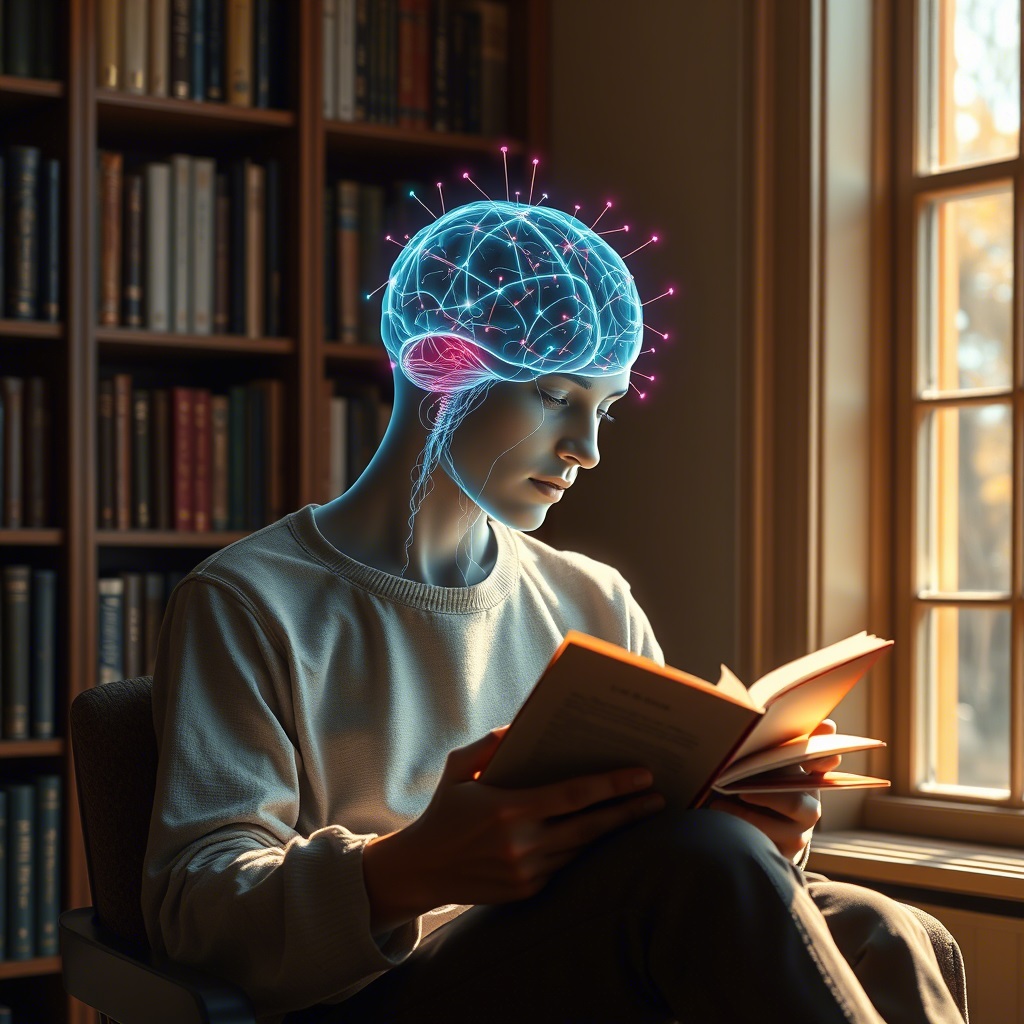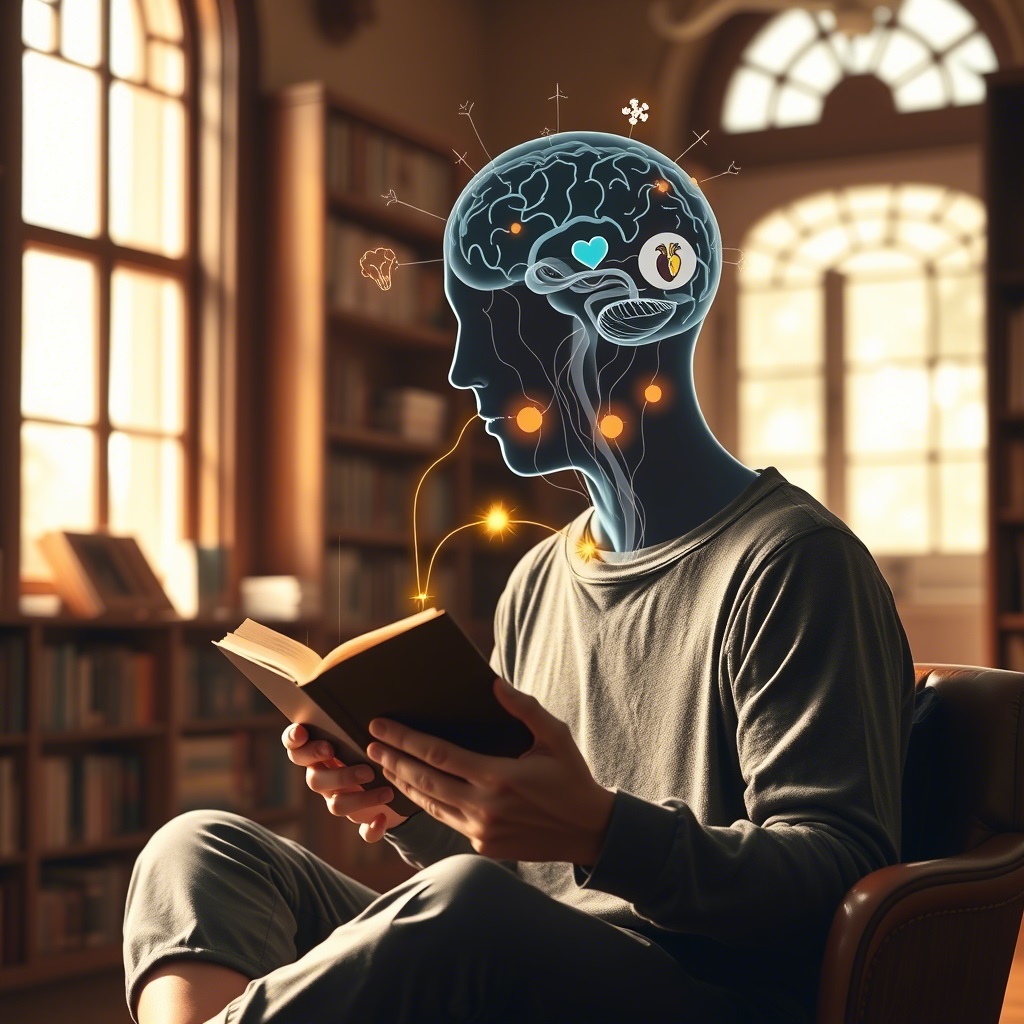
Have you ever read an immersive book that made you feel inside the story? That’s not just imagination—it’s your brain actively reshaping itself. Reading does more than pass the time. It triggers chemical reactions, builds neural pathways, and changes how your brain works and feels. This isn’t speculation. It’s confirmed through years of neuroscience research, imaging scans, and long-term behavioral studies.
Reading involves multiple brain systems: vision, language, emotion, and memory. The brain responds by adapting its structure and function when we read consistently. This process is backed by neuroplasticity, the brain’s natural ability to rewire based on experience.
Let’s explore how reading transforms your brain on a chemical and structural level—and why that matters for your memory, empathy, focus, and mental health.
Table of Content
- What Happens in the Brain When You Read?
- Neuroplasticity: The Brain's Rewiring Ability
- Changes in Brain Structure
- How Reading Improves Brain Function
- The Connection Between Reading and Empathy
- Reading Strengthens Memory and Learning
- Dopamine: The Brain’s Reward Response to Reading
- Screen Reading vs. Deep Reading
- Reading Reduces Stress and Supports Mental Health
- Fiction vs. Non-Fiction: Different Brain Effects
- The Role of Reading in Childhood Brain Development
- Reading Supports Adult Brain Growth
- Protecting the Brain Against Aging
- Real-Life Results: Literacy Programs and Brain Growth
- Expert Insights on Reading and Brain Chemistry
- Why Many People Don’t Read Deeply Anymore
- Easy Ways to Read More and Boost Brain Chemistry
- Takeaways: How Reading Shapes the Brain
- Conclusion
- FAQs

What Happens in the Brain When You Read?
Reading activates many parts of the brain all at once:
-
The visual cortex identifies letters and symbols.
-
The occipital and parietal lobes process the words.
-
Broca’s and Wernicke’s areas decode meaning and context.
-
The frontal lobe applies logic and decision-making.
-
The limbic system adds emotion and memory.
This collaboration is powerful. According to Stanford researchers, reading increases blood flow to the prefrontal cortex, which helps with focused attention and reflection. It’s like a workout for the brain—strengthening logic and emotion.
Neuroplasticity: The Brain's Rewiring Ability
One of the most fascinating discoveries in brain science is neuroplasticity. It means your brain adapts based on how you use it. Reading encourages this adaptation.
A study from Carnegie Mellon University tracked children undergoing intensive reading training. The results? Their brains developed denser white matter—the fibers that help different parts of the brain communicate.
This doesn’t only apply to kids. Adults also experience brain changes when they read regularly, reinforcing that learning is lifelong.
Changes in Brain Structure
Reading rewires both the grey and white matter in your brain. Research led by neuroscientist Gregory Berns found that reading fiction changed brain connectivity for days. The left temporal cortex—linked to language—lit up more actively, while the somatosensory cortex showed increased connectivity.
This means the brain begins to simulate the sensations of the characters in the story. You’re not just reading about running—you feel like you’re running. That’s why stories can feel so personal.
How Reading Improves Brain Function
Beyond structure, reading affects brain function. Functional MRI scans show increased connectivity between brain networks after reading, especially in areas related to comprehension and interpretation.
This connectivity lasts beyond the reading session itself. The phenomenon, sometimes called “shadow activity,” keeps your brain alert and active in reflective thinking, even after you’ve finished the book.
The Connection Between Reading and Empathy
Reading fiction—exceptionally character-driven stories—activates the brain’s empathy circuits.
Studies by David Kidd and Emanuele Castano demonstrated that reading literary fiction improved people’s ability to read others’ emotions, known as “theory of mind.” Mirror neurons, which fire when we observe others’ actions or feelings, get stimulated through storytelling.
This is more than emotional—it has a measurable effect on how we relate to others. Regular fiction readers often score higher on empathy and emotional intelligence assessments.
Reading Strengthens Memory and Learning
Reading trains the hippocampus, the brain’s memory hub. Tracking characters, following plots, and connecting concepts strengthen working memory.
Research from the NIH shows that regular reading can increase vocabulary, support memory recall, and even improve fluid reasoning. It’s not just retention—it’s mental flexibility.
Dopamine: The Brain’s Reward Response to Reading
When you get lost in a book, your brain rewards you. Harvard researchers have observed dopamine release during suspense, learning, or emotional resonance in stories.
Dopamine is tied to motivation and pleasure. It’s the same system involved in solving puzzles or achieving goals. This internal reward mechanism makes reading habit-forming in a healthy way.
Screen Reading vs. Deep Reading
Reading off a screen isn’t the same as reading a physical book or even focused digital reading.
The American Psychological Association found that digital reading often leads to shallow processing. People skim more and comprehend less. Paper-based or immersive reading improves retention, critical thinking, and understanding.
Reading on screens tends to split attention. In contrast, deep reading trains the brain for focus—a skill that’s becoming rare.
Reading Reduces Stress and Supports Mental Health
The University of Sussex reported that reading can lower stress levels by up to 68%. Six minutes of reading reduced heart rate and muscle tension more than music or walking.
Reading is also linked to sleep, reduces anxiety, and improves emotional balance. It gives the brain time to reset, process, and regulate emotions, acting as a natural form of mental hygiene.
Fiction vs. Non-Fiction: Different Brain Effects
While both genres stimulate the brain, they do so in unique ways:
-
Fiction activates imagination, emotion, and social understanding.
-
Non-fiction boosts factual memory, reasoning, and critical thinking.
According to a Science study, fiction readers scored higher on interpreting emotional cues. Non-fiction, on the other hand, activates analytical pathways.
The Role of Reading in Childhood Brain Development
Early exposure to books helps children build the foundation of cognitive skills. Kids who are read to develop stronger language skills and perform better in school regularly.
Carnegie Mellon’s research on early literacy showed structural changes in the brain's white matter after just a few months of reading intervention.
Reading also strengthens auditory and visual processing, laying the groundwork for problem-solving and reasoning.
Reading Supports Adult Brain Growth
It’s a myth that brain growth stops after childhood. Adult brains continue to form new neurons, especially in the hippocampus.
Reading supports this process by encouraging neurogenesis and preserving memory. Lifelong readers are more mentally agile and show better cognitive performance as they age.
Protecting the Brain Against Aging
Yale University researchers followed older adults over 12 years and found that on average, people who read books for 30 minutes a day lived two years longer than those who didn’t.
Regular readers showed slower cognitive decline and better problem-solving. This is linked to cognitive reserve—the brain’s resilience to damage built through intellectual stimulation.
Real-Life Results: Literacy Programs and Brain Growth
Prison programs that incorporate reading have shown reduced reoffending rates. Inmates who read regularly reported improved emotional control, empathy, and future planning.
These programs aren’t just about skill but about rewiring how the brain responds to stress, risk, and reflection.
Expert Insights on Reading and Brain Chemistry
Dr. Maryanne Wolf, a cognitive neuroscientist, warns that deep reading is becoming endangered. She points out that digital habits are replacing focused attention with immersive reading.
Dr. Stanislas Dehaene explains how learning to read repurposes existing brain circuits. The brain has no reading center; it adapts circuits originally designed for visual recognition and speech.
This means reading reshapes how we think—literally.
Why Many People Don’t Read Deeply Anymore
Despite the proven benefits, many people feel disconnected from books. Why?
-
Screens offer quicker dopamine hits.
-
People are overwhelmed with work, noise, and distractions.
-
There’s a belief that watching or listening is enough.
But attention is like a muscle. Reading helps rebuild it.
Easy Ways to Read More and Boost Brain Chemistry
You don’t need hours. Small steps make a difference:
-
Start with 10–15 minutes before bed.
-
Carry a book or e-reader instead of checking your phone.
-
Read a genre that interests you—mystery, memoir, history.
-
Join a book club or reading group for discussion and accountability.
Consistency is key. Reading daily—even for a few minutes—trains your brain to seek focus, reflection, and engagement.
Takeaways: How Reading Shapes the Brain
-
Reading stimulates multiple areas of the brain at once.
-
It builds memory, attention, and emotional intelligence.
-
Reading creates long-term changes in brain structure and function.
-
It reduces stress, improves mental health, and supports healthy aging.
-
Fiction and non-fiction offer different but complementary brain benefits.
Conclusion
Reading is more than personal growth. It’s a form of brain development that anyone can access. Whether flipping through a novel, studying a memoir, or reading with a child, you're training your brain to think deeper, feel more, and stay sharp longer.
There’s no age limit to these benefits. Your brain responds every time you read. That alone makes it one of the most valuable habits you can develop.
FAQs
1. Can reading really change brain chemistry?
Yes. Reading stimulates dopamine release, increases connectivity between brain regions, and influences how neurons communicate.
2. How much reading is enough to see benefits?
Even 15–30 minutes daily can improve memory, focus, and emotional health.
3. Does the brain respond differently to fiction and non-fiction?
Yes. Fiction boosts empathy and imagination, while non-fiction enhances critical thinking and factual memory.
4. Is digital reading as effective as print?
Focused digital reading can be helpful, but paper reading tends to improve comprehension and attention span better.
5. Can reading help with mental health?
Yes. Reading reduces stress, improves mood, and offers emotional regulation by providing perspective and cognitive rest.
Mental Health




